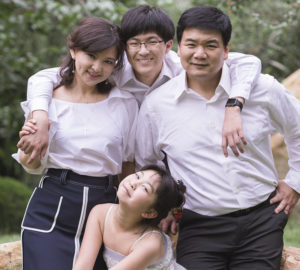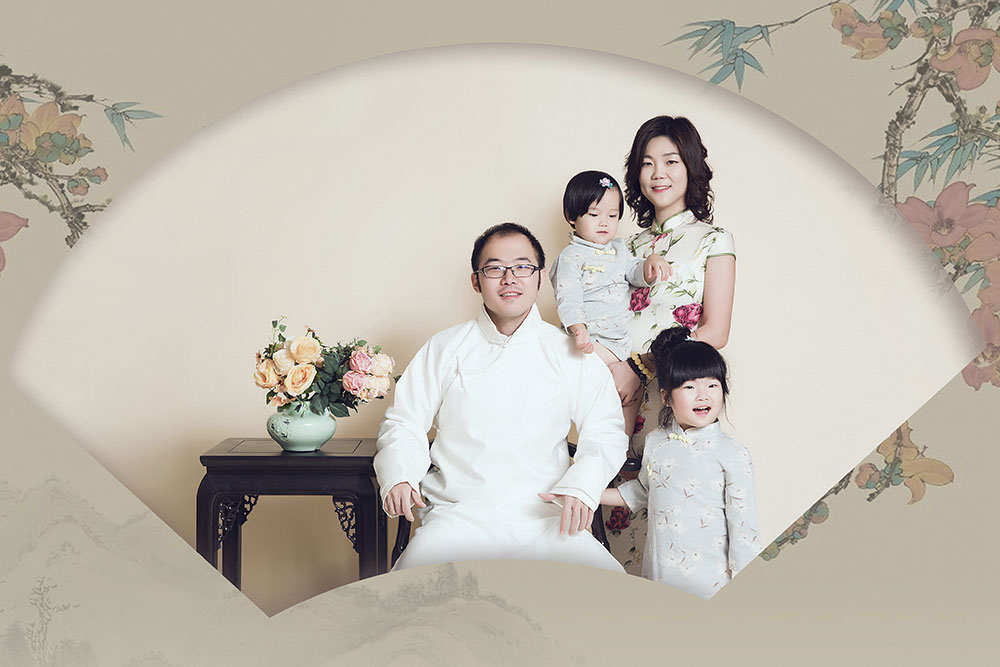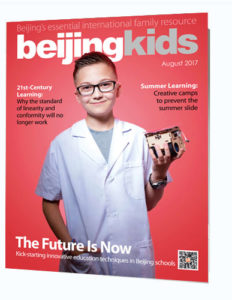 Amy Chen, originally from the US, has been in Beijing for six years, brought here originally by her husband Adam’s job. She works as General Manager at the local office of a US software start-up called Bluestacks. She and Adam have a son Matthew, age 17, and daughter Rachel, age 13, both of whom attend Dulwich College Beijing (DCB). Matthew recently demonstrated his academic prowess by writing and publishing his own book, Easy as Raspberry Pi, which explains how to program a simple computer to access “the internet of things.”
Amy Chen, originally from the US, has been in Beijing for six years, brought here originally by her husband Adam’s job. She works as General Manager at the local office of a US software start-up called Bluestacks. She and Adam have a son Matthew, age 17, and daughter Rachel, age 13, both of whom attend Dulwich College Beijing (DCB). Matthew recently demonstrated his academic prowess by writing and publishing his own book, Easy as Raspberry Pi, which explains how to program a simple computer to access “the internet of things.”
What expectations do you have of your child(ren) academically, and how do you communicate your expectations?
I adjust my expectations based on children’s unique characters and talents. I have two very different kids: Matthew has a broad range of interests and wants to get involved in many activities, while Rachel is more quiet and prefers to stay home. For Matthew, I urge him to prioritize and focus on a few to get the best result. For Rachel, I encourage her to stay active, get out of her comfort zone, and to try sports and other activities so she can be more open-minded and overcome her fears. I have high expectations for Matthew as he is very smart, and will have much lower expectations for Rachel as she is still working on her shyness.
Do your children do any extra schooling or have personal tuition?
Not regularly, but if our children show interest in something and want to learn more, or need to have better understanding of something that is not taken care of by their school teachers, we’d make arrangements.
How much homework do your children do? Do you think it’s enough, too much, or too little?Matthew has a lot of homework which is common for Year 12 [Grade 11]. International Baccalaureate (IB) is very demanding, requiring students to have six activities and study six subjects, with three of them at college level, plus an extended essay on a topic from one of the subjects. We made a choice for Matthew to take IB to prepare him for a top college in the US. Rachel has about one hour homework each school day, and the amount is about right.
Do your children ever compare themselves to other students in their class, favorably or unfavorably? If so how do you respond?
Matthew almost never makes comparisons, but Rachel does it often. I am always telling Rachel that she only needs to compare to her own past, to be sure she has made progress and tried her best. This is much more important than how she compares to others.
Do you think it’s more important for your children to focus on the things they’re good at, or catch up on their weaker areas?
I think it would be great if they can do both. I’d encourage them to work on personal projects in the area that they are good at, and improve the weaker areas to an acceptable standard unless it is an elective subject.
How would you respond if your children told you they didn’t want to go to college?
I would ask them what they want to do if not going to college. What is the chance of them finding a job they like without having a college degree? How do they plan to support themselves?
What’s the best thing teachers have done for your children’s education? And the worse?
Teachers provide a stable platform for kids to learn in a set environment – but it is not very flexible. When kids have questions, they often feel uncomfortable asking them in public, and they are not confident enough to schedule a one-on-one session with the teachers. Many kids still have problems with authorities.
Should education be focused on preparing children for their future career, or for life more generally?
A holistic education should help kids to prepare for life more generally, including developing intellectual curiosity, the ability to learn on their own, the ability to work with teams and independently, and the ability to communicate with others.
Do you hope that your children will do better than you did academically?
Of course we all hope our kids will do well academically, and avoid making the same mistakes we made when we were young. However, each child is unique and some are good at it, some are not. I’d encourage them to do their best. In my case, Matthew is definitely doing better than me (he got a full score on the ACT) and Rachel is not (at least, not yet!)

Keya Mu came to Beijing after graduating, because, she says, it’s “a place full of possibilities and opportunities.” She’s been quick to seize those opportunities, having founded her own company, Yeguo Jewellery. She also loves the way Beijing is such an international city, while preserving her beloved Chinese style. She’s married to civil servant Lei Zhao, and they have two children, Elsa (4) and Chloe (2).
What expectations do you have of your children academically, and how do you communicate your expectations?
Sometimes when I look at my two little girls, I imagine the academic success they will achieve in the future, although it doesn’t really depend on my wishes.I wish for my older daughter to become an architect who will design many famous buildings. I wish for my younger daughter to become an actress who will play in many great works. But I won’t express such wishes to them. I only tell them “do what you love.”
Do your children do any extra schooling or have personal tuition?
Elsa also studies drama and horseback riding after class.
How much homework do your children do? Do you think it’s enough, too much, or too little?
I think deciding on the amount of homework has much to do with the personality and studying habits of the kid, and the guidance of time management from parents. To begin with, different personalities result in different perceptions of the amount of homework. Take my older daughter, for example: she could spend a long time on reading and drawing. She has an innate concentration on things. She loves to solve problems. If she can’t write well now, she will practice until she can do it better. Therefore, she is not sensitive to the amount of homework because she will finish it somehow. As for my younger daughter, she is more active and athletic. It’s more difficult for her to focus on things. So the same amount of homework might be no problem to my older daughter, and too much to my younger one. Secondly, studying habits have a direct influence on the amount of homework they can take. Should they finish homework first thing after school, or should they play until the last minute before they have to start doing their homework? Should they finish the difficult or the easy part first? Should they do their favorite subjects first or leave them to the end? Last but not least, parents should guide kids to manage their time effectively.
Do your children ever compare themselves to other students in their class, favorably or unfavorably? If so how do you respond?
Kids like to compare with each other, especially girls. Some common comparisons between kids are not worth mentioning. For instance, my daughter has always been the youngest kid in class, the fact that there is nobody younger than she is makes her unhappy. There are other comparisons that get me thinking. Showing-off between kids is one example. It occurs fairly commonly that her friends tell her: “My dress is prettier than yours,” or “Your drawing is not as good as mine.” She is not happy about this. When the comparison is superficial, I will just help to guide her away from bad feelings. Unfriendly comments from other kids is another example. One day she was crying, and told me: “XXX said I am not beautiful”. In situations like this, it requires communication and guidance, such as telling her what beauty is, letting her understand that being polite is beautiful, helping others is beautiful, and finishing homework is also beautiful.
Do you think it’s more important for your children to focus on the things they’re good at, or catch up on their weaker areas?
I’m in favor of focusing on strengths. We have wasted plenty of time on catching up on our weaknesses, with very slim results. It’s really difficult to be good at everything! In the education field, there is a theory called “Multiple Intelligences”. Simply put, it means that every child is good at something different: music, language, sport, logic, nature, space, relationships, introspection… each individual is unique! As for the academic success we have previously discussed, strengths are surely to be paid more attention to. It’s not hard to discover a child’s strengths, but it’s hard to show understanding to a child’s weaknesses.
How would you respond if your children told you they didn’t want to go to college?
I think if she had the courage to confess to me, she must have already thought of thousands of reasons to convince me. So if someday she comes up to me and tells me she doesn’t want to go to college, I will choose to listen and thank her for letting me know, because at least she wants to talk to me about it. If she does convince me, I would give her a year of experience, to live the life she wants. But I won’t be supportive if she wants to give up college completely. Because besides study, college life itself is important. Moreover, whether she chooses to stay in college or not, she should have the persistence and ability for lifelong study.
What’s the best thing teachers have done for your children’s education? And the worse?
The best experience is with a drama teacher, whose use of language and way of interacting influenced my kid greatly. She has also inspired us parents. It was wonderful! The worst was a piano teacher who made my girl cry and lose interest in piano by using old-fashioned and boring teaching methods. This was our worst education experience by far.
Should education be focused on preparing children for their future career, or for life more generally?
Education focusing on future careers is preparing children to be bourgeois, while education focusing on life is preparing children to join the social elite. Therefore, I think the essence of education is to tell you the way everything works, to make you understand the world and yourself.
Do you hope that your children will do better than you did academically?
I hope my children will be more accomplished academically than I am, because they are living in a more diverse society, where there are more abundant resources and more options in education.





